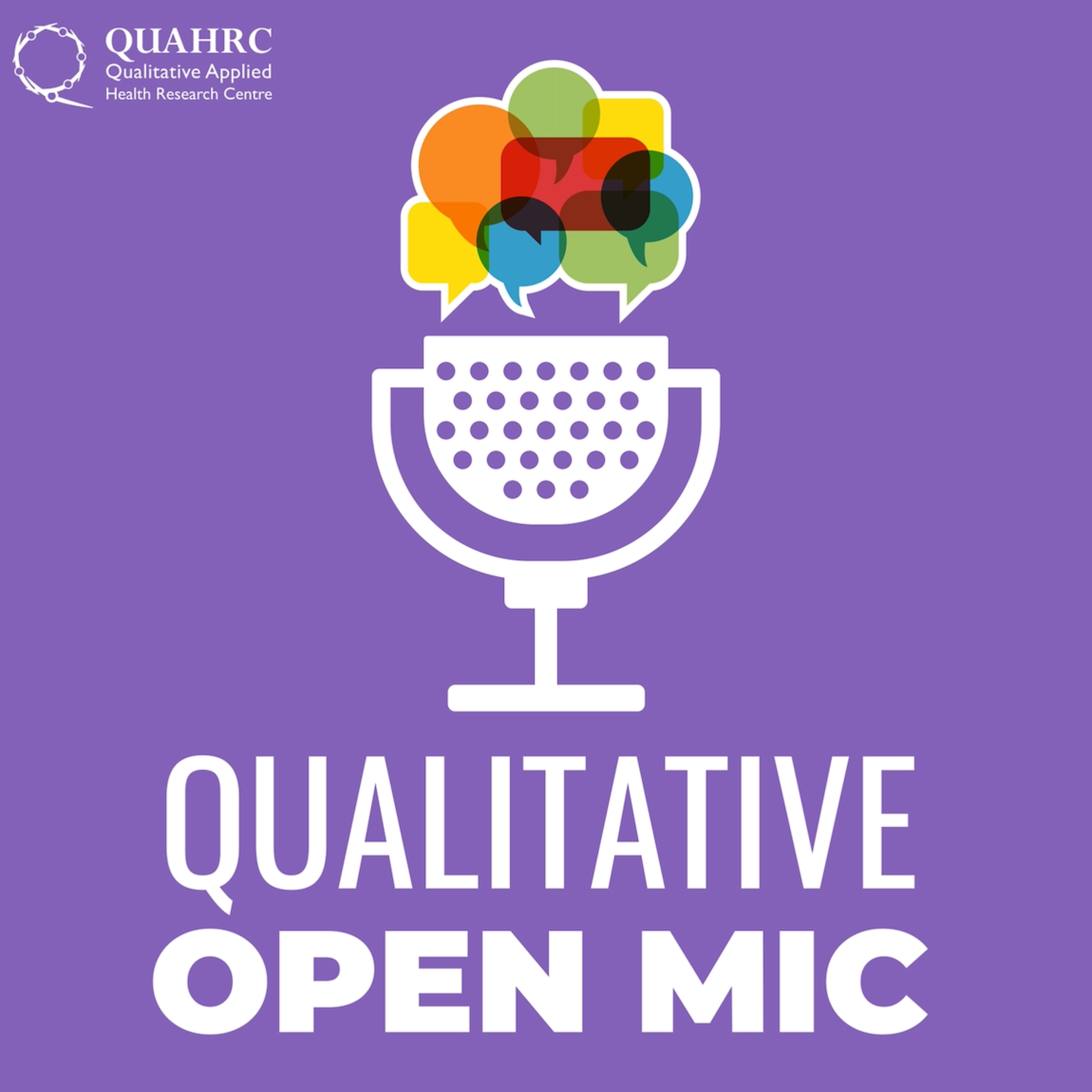

The Qualitative Open Mic
quahrc
The Qualitative Applied Health Research Centre dives into current applications, innovations, and conundrums for all those interested in qualitative research, academics and non-academics alike.
Episodes
Mentioned books

Oct 22, 2025 • 32min
Neurodiversity Matters: Alyssa Hillary Zisk on Augmentative and Alternative Communication
Autistic people have a whole constellation of communication needs and styles, but these are not always understood or accommodated by researchers. This month, Sohail interviews Alyssa Hillary Zisk about Augmentative and Alternative Communication (AAC): what it is, the range of communication profiles it can help accommodate, and how qualitative inquiry into autistic experiences helped name these to increase understanding.

Sep 17, 2025 • 31min
Neurodiversity Matters: Daria Khanolainen on dyslexia and self-esteem
Neurodiversity and neurodivergence have been revolutionary ideas in autism research, and later in ADHD. But how do they apply to other diagnoses or experiences? This month Sohail speaks to Dr Daria Khanolainen, a dyslexia researcher in Finland, about qualitative dyslexia research, self-esteem, and pathologising reading difficulties.

Aug 28, 2025 • 31min
Qualitative Open Mic: Anti-racist Qualitative Health Research - Bee Damara on theory
Bee Damara, a researcher at King's College London focusing on modern slavery and anti-racist theories, dives deep into critical race theory's role in human trafficking research. She discusses how historical context shapes contemporary exploitation, emphasizing survivors' voices in guiding research. Bee explores insider ethnography and photo voice methods, portraying the complex socio-economic realities in South Africa. The conversation advocates for inclusive research methodologies that amplify marginalized perspectives, challenging existing frameworks and addressing systemic inequalities.

Aug 20, 2025 • 28min
Neurodiversity Matters: Victoria Castle on participatory research and neuroinclusive parenting measures
Parents get a lot of advice, and a lot of it is conflicting or inappropriate. Parenting research aims to be better than that – but is it, when neurodivergence is in the mix? This month Sohail speaks to Dr Victoria Castle about her participatory research using innovative qualitative methods to co-develop ways to measure parenting that work for neurodivergent parents and parents of neurodivergent children.

Jul 16, 2025 • 37min
Neurodiversity Matters: Elizabeth Hauke on neurodivergent autoethnography and inclusive education
Elizabeth Hauke, Principal Teaching Fellow at Imperial College London and advocate for inclusive education, dives into the world of autoethnography and its significance for neurodivergent individuals. She shares personal narratives that illuminate the complexities of neurodivergence in research and educational settings. Hauke critiques traditional assessment methods, proposing innovative approaches like video diaries to foster inclusivity. The conversation also touches on the need for educational reforms that embrace diverse learning styles, promoting healthier teaching practices.

May 21, 2025 • 28min
Neurodiversity Matters: Hannah Belcher on (un)masking and mental health research
Sohail interviews Dr Hannah Belcher, author of Taking off the Mask and lecturer in user-led research at King's. They cover some of the ethical complexities of the neurodiversity framework; how the specifically gendered nature of mainstream autism research has overlooked the experiences of women and non binary people; and how all this plays into issues around masking, social pressure, and mental health.

Apr 16, 2025 • 34min
Neurodiversity Matters: Morénike Giwa Onaiwu on antiracist advocacy
Has qualitative research been complacent about its ability to highlight marginalised perspectives? Sohail speaks to Dr Morénike Giwa Onaiwu about forthcoming anthology "Neurodiversity en Noir" and platforming Black neurodivergent voices.

7 snips
Mar 19, 2025 • 36min
Neurodiversity Matters: Monique Botha on funding priorities and community justice
Monique Botha, an assistant professor at Durham University, advocates for neurodivergent communities through community-led research. She discusses the disconnect between funding priorities in autism research and actual community needs. Botha emphasizes the importance of citational justice and the need to incorporate personal narratives into academic discourse. She calls for dismantling oppressive systems in research and stresses the value of emotional experiences for a more inclusive understanding of neurodiversity. Ultimately, her insights challenge traditional academic approaches and offer a transformative vision for the future.

Feb 19, 2025 • 31min
Neurodiversity Matters: Damian Milton on double empathy and autistic worlds
Dr. Damian Milton, a senior lecturer at the Tizard Centre and a prominent advocate for participatory autism research, engages in a deep discussion about the double empathy problem. He critiques traditional autism theories for overlooking internal autistic experiences and highlights the need for qualitative insights. Milton stresses how ableism impacts autism research and champions the importance of autistic-led spaces in academia. Additionally, he humorously reclaims neurodiversity through terms like 'NeuroSpicy,' fostering identity and community strength.

Jan 15, 2025 • 33min
Qualitative Controversies: Johnny Saldaña on blue collar qualitative research
Johnny Saldaña, Professor emeritus of Arizona State University and a trailblazer in qualitative inquiry, discusses his controversial stance on blue-collar qualitative research. He challenges the elitism pervasive in academia and advocates for the inclusion of diverse voices. Saldaña shares insights on the dangers of academic jargon, pushing for clearer communication to foster accessibility. He emphasizes the importance of lived experiences and multidisciplinary approaches in qualitative research, ultimately calling for solutions that resonate with the communities studied.


